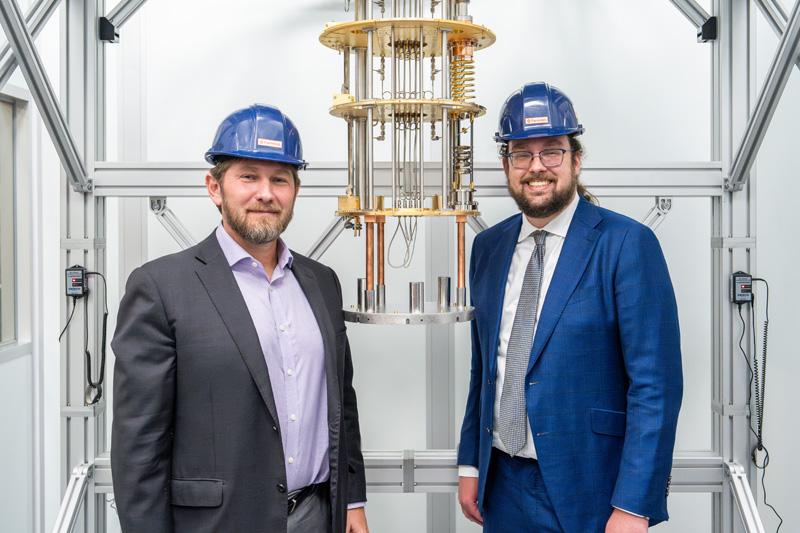Applications
 Part of the Oxford Instruments Group
Part of the Oxford Instruments Group
Expand
Collapse
Fermi National Accelerator Laboratory (Fermilab) is a US Department of Energy national laboratory specialising in high-energy particle physics. We are proud to say that Fermilab’s new quantum sensor and computing research centre includes our Proteox systems, part of an experimental set up created to study the performance of quantum chips in different radiation environments.
Here, Dan Baxter, Adjunct Assistant Professor / Associate Scientist, Fermi National Accelerator Laboratory, talks about the new facilities, which include an underground QUIET lab, and a surface level LOUD lab, with identical equipment. Dan also discusses another potential future application of his team’s work: the development of novel, highly sensitive particle detectors that could be used in dark matter research.
What are QUIET and LOUD, and what are they investigating?
QUIET and LOUD are two facilities that are part of the Quantum Science Center at Fermilab. The Quantum Science Center is one of five Department of Energy National Quantum Initiative centres in the United States, hosted out of Oak Ridge National Lab, with Fermilab as one of the founding partners. These facilities are investigating the effects of particle radiation on superconducting qubit performance. The main goal is to model and potentially reduce the impact of radiation on quantum systems for the purposes of quantum computing.
How do QUIET and LOUD differ from each other?
Both facilities are identical except for their location. LOUD is on the surface, while QUIET is located 225 metres water equivalent underground (about 100 metres of rock). This setup allows us to study the performance of quantum chips in different radiation environments, as the underground facility has 200 times fewer cosmic ray muons passing through. By isolating this variable, we can study other factors affecting qubit performance more effectively.
Why is it important to study the effects of radiation on quantum systems?
Quantum computers store information in quantum states, which need to be incredibly well isolated from their environment. Any type of noise, vibration, or radiation interacting with the system can cause a loss of information. In the last five years, it has become clear that different mechanisms for depositing energy near a quantum system can cause information loss in a quantum computing device. By studying these effects in detail, we hope to develop models for how radiation causes information loss and design more robust quantum devices that are less susceptible to this type of interference.
What role does the dilution refrigerator play in your research?
The dilution refrigerator is crucial for our research because it allows us to create the extremely cold temperatures necessary for superconducting qubits to function. We need to minimise thermal noise and get as close to absolute zero as possible. This cold environment is essential not just for the quantum chip itself, but also for the surrounding surfaces to reduce blackbody radiation that could interfere with the quantum system. The superconducting structures in our qubits need to be at temperatures where they actually exhibit superconducting behaviour, and the colder we can make the entire system, the better we can isolate our qubits from thermal noise and other environmental factors.
Are there any challenges in operating equipment underground?
While operating equipment underground isn't significantly more complicated, it does require more organisation and planning. For example, filling a nitrogen trap or bringing necessary equipment underground takes more forethought. It can be frustrating to realise you've left something in the surface lab and have to go all the way back up. However, the benefits of the reduced radiation environment outweigh these minor inconveniences. The underground facility is actually quite convenient, being only about a 10-minute trip from the surface offices. Access is primarily through a freight elevator, with a secondary open shaft for larger equipment that doesn't fit in the elevator.

Dan Baxter with Travis Humble, Director of QSC at Oak Ridge National Lab. Photography by Dan Svoboda
What is the current status of the QUIET and LOUD projects?
LOUD has been operational for over a year, and we've been studying qubit device performance there. QUIET is just coming online now, and we hope to have the first devices in there this fall. Currently, we're performing basic system characterisations and ensuring everything is performing at the desired level before installing the actual qubit devices. This includes diagnosing RF systems and setting up the right amplification and attenuation. Once the systems are optimised, we plan to run a series of experiments, some of which will be quick comparisons between the surface and underground fridges, while others will be longer-term studies to understand the long-term effects of different processes on qubit performance.
Is there a connection between this research and dark matter detection?
Yes, there is an interesting connection. The extreme sensitivity of qubits to their environment opens up the possibility of using them as particle sensors, potentially at lower energies than current detectors. This could allow us to probe new models of dark matter. The questions we're answering for quantum computing align closely with those for developing novel dark matter detectors, making this research particularly exciting from a fundamental science perspective.
Just as we're studying how to mitigate the effects of radiation on qubits for quantum computing, we could potentially use this knowledge to make qubits more sensitive to specific types of interactions. This could lead to the development of much better detectors, especially for low-energy interactions that are difficult to detect with current technologies. Recently, Fermilab hosted a large international workshop called Radiation Impact on Superconducting Qubits (RISQ), bringing together experts from both the dark matter and quantum computing fields to discuss these potential applications.
What are the potential future applications of this research?
Our research has two main potential applications. First, it could lead to more stable and robust quantum computing systems by mitigating the effects of radiation on qubits. This could help improve the performance and reliability of future quantum computers. Second, it could result in the development of novel, highly sensitive particle detectors that could be used in dark matter research, potentially allowing us to explore energy regimes that we haven't been able to investigate before.
The exciting aspect of this research is that currently, the questions we need to answer for both quantum computing and potential dark matter detection applications are the same. We haven't yet reached the point where we need to specialise our research for one application or the other. This alignment of goals in two different fields makes our work particularly compelling and potentially groundbreaking for both quantum computing and fundamental physics research.
As an equipment manufacturer, the overlapping dual track of qubit and quantum sensor development is really exciting, as our Proteox dilution fridges show their strengths in both quantum technologies and dark matter search.
One of the reasons that Proteox is ideal for dark matter detection experiments in underground laboratories is the ease with which you can control it remotely using our web-based, platform-independent software oi.DECS, remotely monitoring the system performance using the oi.DECS live dashboards.
Find out more about the Proteox family here and contact us for more information.
Further reading

Professor Daniel Baxter
Adjunct Assistant Professor / Associate Scientist, Fermi National Accelerator Laboratory
"The dilution refrigerator is crucial for our research because it allows us to create the extremely cold temperatures necessary for superconducting qubits to function."
"The extreme sensitivity of qubits to their environment opens up the possibility of using them as particle sensors, potentially at lower energies than current detectors. This could allow us to probe new models of dark matter."
"Our research could lead to more stable and robust quantum computing systems by mitigating the effects of radiation on qubits. This could help improve the performance and reliability of future quantum computers."